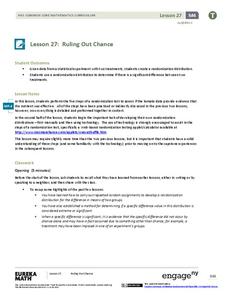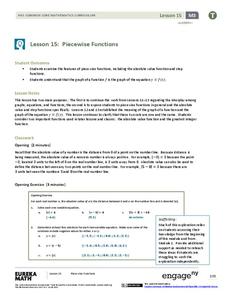Curated OER
More Complex Fraction Problems
If your fifth graders have mastered fractions, push them to the next level! They multiply fractions by whole numbers and decimals (in the form of money math). The worksheet provides space for pupils to write out their work, based on two...
Curated OER
Mixed Tables
How many pennies does each person get? There are four visual division problems for young mathematicians to solve, and they divide 12 pennies among a set of people for each. They draw the coins above each recipient and then write the...
DK Publishing
Real-life Problems, Working with Fractions
Test your fifth graders' math skills with five word problems involving fractions. After studying two examples at the top of the page, pupils multiply fractions by whole numbers to solve each word problem. The worksheet provides two...
DK Publishing
Taking 1 Away
Kindergartners who love animals will adore this sweet subtraction activity. They study pictures of birds, frogs, and ladybugs, and count how many are left if they take away one. Once they finish, they can color the animals and display...
DK Publishing
Taking 2 Away
Go deep and dive under the sea with subtraction! Kindergartners practice taking two away from different groups of fish and writing in the answer. Have them color the fish for extra fun after they finish their math work.
DK Publishing
Using the 2 Times Tables, Part 2
Put on a happy face! Third graders master the two times table with the help of a worksheet that prompts them to match groups of happy faces with corresponding numbers. The catch? Each happy face represents two faces! A great way to...
Curated OER
Venn Diagrams, Part 3
Can your first graders interpret Venn diagrams? Different sets of clues help pupils narrow down a specific number in different shapes. They determine odds and evens, greater than or less than, and what shape the number is in. A fun...
Curated OER
What's in Your Piggy Bank?
Fill up your piggy banks! First graders find different ways to fill up cute piggy banks with 30 cents. Will they use two dimes and two nickels? Or a quarter and five pennies? Use this activity with groups to reinforce your money math...
DK Publishing
Writing Equivalent Number Sentences
Connect the four operations with a series of number sentences. After studying the examples at the top of the page, third graders find ways to write related number sentences for addition, subtraction, multiplication, and division...
Illustrative Mathematics
Seeing is Believing
How many visual models can be used to show multiplication? Three basic kinds of models can be used to represent and explain the equation 4 x (9 + 2). The commentary section provides description and graphics to explain the set...
North Carolina State University
Shapes
Expose youngsters to 3-D objects in a hands-on learning activity involving marshmallows and toothpicks. Engage your young mathematicians by introducing them to 3-D shapes by means of a story book. Explore 3-D shapes by manipulating...
Curated OER
Jon and Charlie's Run
Let's use math to solve an argument. Jon and Charlie are debating about who can run farther, but who is right? That's what your class will figure out as they apply their understanding of fractions to this real-life situation. A simple,...
Curated OER
The Very Hungry Caterpillar
A good book deserves to be followed up by a good worksheet. Here is a great resource which is intended for use after reading The Very Hungry Caterpillar by Eric Carle. It includes several activity ideas that promote skill development in...
Denton Independent School District
Pieces to the Puzzle Fraction Project
Four polygons each have a fraction with unlike denominators printed on them. Creative math minds select several shapes to create a design with and then write and solve a math problem involving the addition of all of the fractions...
Rational Number Project
Initial Fraction Ideas: Lesson 3
Visual models support young mathematicians as they deepen their fractional number sense in this elementary math lesson. Using fraction circle manipulatives, children explore basic unit fractions as they develop the fundamental...
Pickle Bums
Catch a Bug Game
Young mathematicians bottle up colorful bugs as they learn to sort and count objects. With six different colored jars and six different colored bugs, children must place the creepy crawlers in their respective containers and see how many...
Mathematics Vision Project
Module 6: Congruence, Construction, and Proof
Trace the links between a variety of math concepts in this far-reaching unit. Ideas that seem very different on the outset (like the distance formula and rigid transformations) come together in very natural and logical ways. This...
EngageNY
More on Modeling Relationships with a Line
How do you create a residual plot? Work as a class and in small groups through the activity in order to learn how to build a residual plot. The activity builds upon previous learning on calculating residuals and serves as a...
EngageNY
Properties of Area
What properties does area possess? Solidify the area properties that pupils learned in previous years. Groups investigate the five properties using four problems, which then provide the basis for a class discussion.
EngageNY
The Scaling Principle for Area
As they investigate scaling figures and calculate the resulting areas, groups determine the area of similar figures. They continue to investigate the results when the vertical and horizontal scales are not equal.
EngageNY
General Pyramids and Cones and Their Cross-Sections
Are pyramids and cones similar in definition to prisms and cylinders? By examining the definitions, pupils determine that pyramids and cones are subsets of general cones. Working in groups, they continue to investigate the relationships...
EngageNY
Analyzing a Verbal Description
What function will describe the insect population growth? Pairs or small groups work together to determine which type of function and specific function will model given scenarios. The scenarios differentiate between linear,...
EngageNY
Ruling Out Chance (part 3)
Pupils analyze group data to identify significant differences. They use simulation to create their own random assignment data for comparison.
EngageNY
Piecewise Functions
Show your class members that if they can graph a linear function, they can graph an absolute value function. Groups create an absolute value graph using a table, then entertain the idea of an absolute value function defined as two...
Other popular searches
- Math Grouping
- Math Grouping Numbers
- Math Grouping and Sorting
- Equal Grouping Math
- Math Brackets
- Math Grouping Tens
- Math Grouping Activity
- Math Grouping Worksheets
- Math Cooperative Grouping
- Math Lessons Ncaa Brackets
- Math Counting and Grouping

























